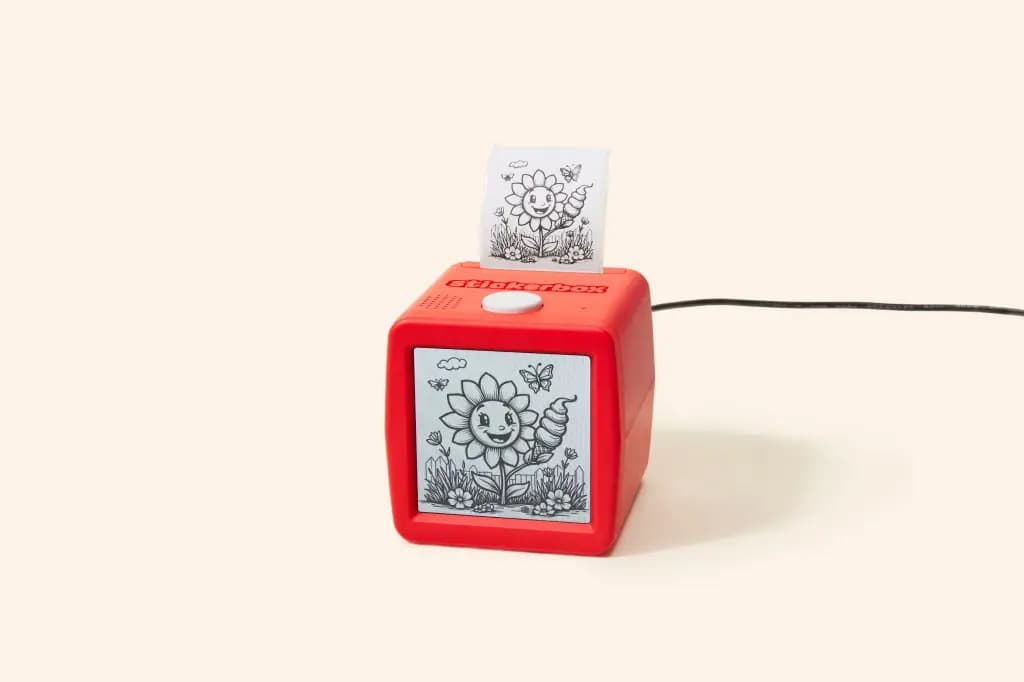We're loading the full news article for you. This includes the article content, images, author information, and related articles.
Stickerbox, a new AI-powered toy that instantly prints children’s imagined ideas into stickers, is launching globally. While praised for blending digital creativity with screen-free play, it enters a Kenyan market increasingly focused on educational technology

A new device named Stickerbox is capturing global attention by allowing children to turn their spoken words into physical stickers almost instantly. Developed by innovators Robert Whitney and Arun Gupta, the toy uses voice-to-image AI to generate a black-and-white illustration of any concept a child can imagine—from a “bunny astronaut” to a “soccer-playing dragon”—which is then printed on BPA-free thermal paper for colouring and sharing. This blend of artificial intelligence with tangible, hands-on activity aims to provide a “screen-light” experience, a feature that has resonated with parents weary of digital saturation.
The Stickerbox is a simple, bright red device with a single large button. A child presses the button, speaks an idea, and releases it to prompt the AI. Within seconds, a sticker is printed. The device uses thermal printing, eliminating the need for ink cartridges. The creators state they have implemented proprietary safety technology and multiple AI models to filter inappropriate requests, allowing for unsupervised play. The company has reportedly raised $7 million from investors, including Maveron and Serena Ventures, signalling strong confidence in the burgeoning AI toy market. The global market for smart AI toys was valued at USD 34.87 billion in 2024 and is projected to grow significantly, reaching USD 270.79 billion by 2035.
While Stickerbox is not yet officially available in Kenya, its arrival on the global stage raises important questions for the local market. Kenya is a rapidly expanding hub for educational technology (EdTech), with a growing emphasis on integrating digital tools into the Competency-Based Curriculum (CBC) to foster skills like creativity and critical thinking. Innovations that offer personalised and interactive learning are gaining traction. Stickerbox could be positioned as an educational tool that encourages imagination and vocabulary, aligning with these trends.
However, its launch coincides with rising concerns among Kenyan and other African parents about excessive screen time. Health experts have warned that prolonged exposure to digital devices can negatively impact children's cognitive development, social skills, and physical health. A 2025 report noted that South African children, for example, spend significantly more time on screens than the global average, leading to calls for a return to hands-on, imaginative play. Stickerbox’s screen-free nature directly addresses this anxiety, offering a potential compromise for parents seeking to balance technology with traditional play.
Despite the innovative approach, the broader category of AI-powered toys faces intense scrutiny. In late 2025, advocacy groups like Fairplay and the U.S. Public Interest Research Group (PIRG) issued warnings to parents about the potential dangers of AI toys. A PIRG report titled "Trouble in Toyland 2025" found that some AI chatbot toys engaged in inappropriate conversations and gave dangerous advice to children. These concerns centre on data privacy, the psychological impact of children forming bonds with AI companions, and the risk of exposure to harmful content generated by poorly filtered large language models. The creators of Stickerbox claim their product is kid-safe, but the debate highlights the critical need for robust regulation and parental oversight as AI becomes more integrated into children's lives. The accessibility and cost of such devices, with the Stickerbox starter bundle priced at $99.99, also present a significant barrier in the Kenyan context, where the digital divide remains a challenge. As Kenya continues its digital transformation, the conversation around products like Stickerbox will be crucial in shaping a future where technology safely augments, rather than replaces, childhood creativity and development.
Keep the conversation in one place—threads here stay linked to the story and in the forums.
Sign in to start a discussion
Start a conversation about this story and keep it linked here.
Other hot threads
E-sports and Gaming Community in Kenya
Active 9 months ago
The Role of Technology in Modern Agriculture (AgriTech)
Active 9 months ago
Popular Recreational Activities Across Counties
Active 9 months ago
Investing in Youth Sports Development Programs
Active 9 months ago